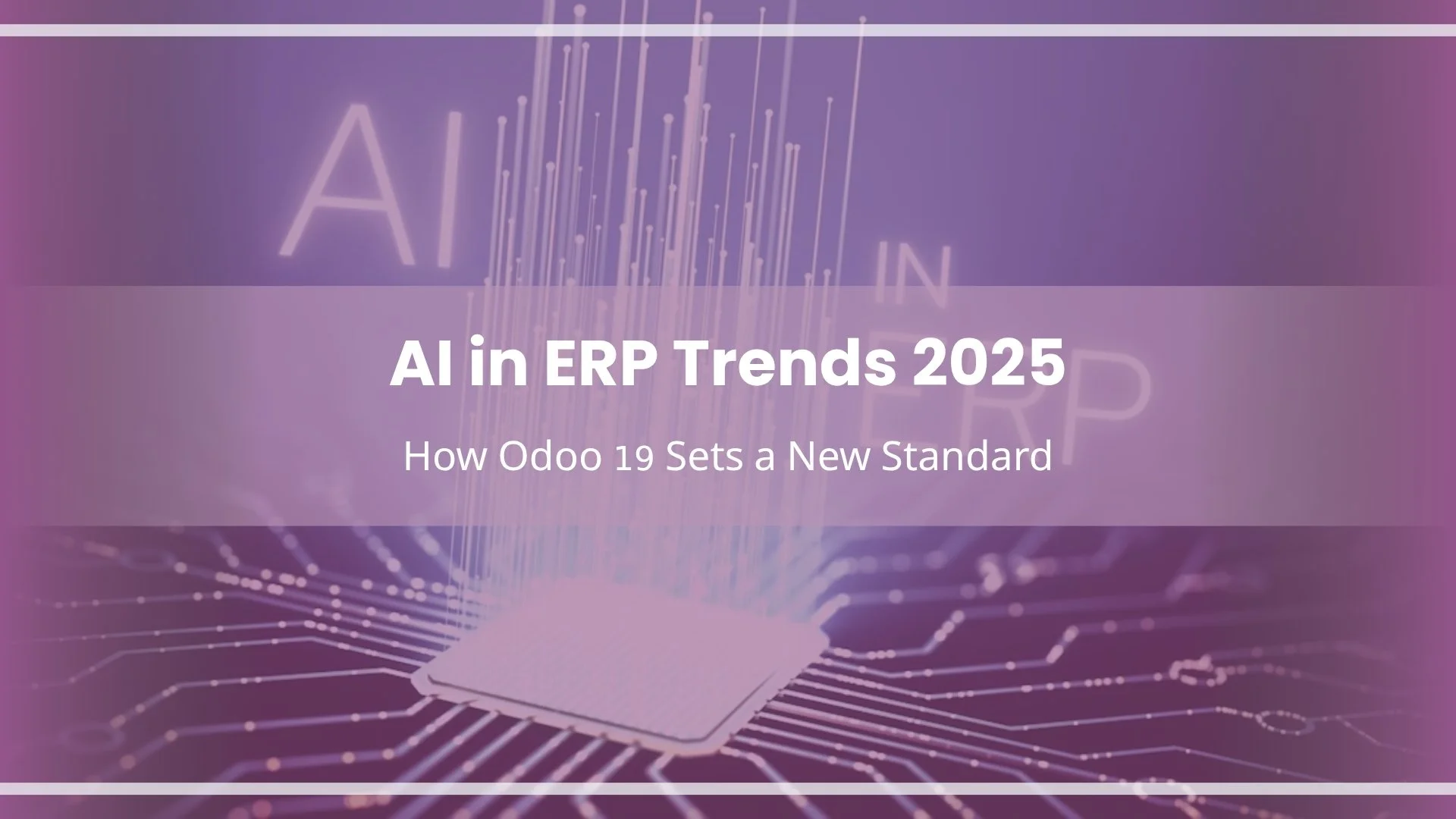
- Byte Legions
- Odoo Knowledge
Introduction to AI in ERP Evolution
Introduction to AI in ERP Evolution
In 2025, intelligent business systems are no longer futuristic concepts. They are becoming everyday tools for companies aiming to stay ahead. AI-powered business automation has shifted ERP platforms from static databases into proactive decision-making partners. Modern organizations now expect their ERP to analyze data, trigger actions, and support teams across all functions.
This evolution is fueled by advanced machine learning models that continuously learn from operational data. Instead of waiting for human input, ERP systems identify trends, detect anomalies, and offer solutions in real time.
Why 2025 Is a Defining Year for ERP Digital Transformation
The ERP landscape is at an inflection point. Enterprises are prioritizing ERP digital transformation initiatives to stay agile in volatile markets. 2025 stands out because businesses are combining AI capabilities with cloud-based ERP solutions, creating intelligent ecosystems that are both scalable and adaptable.
The demand is driven by rising operational complexity, the need for real-time visibility, and the pressure to do more with fewer resources. As companies mature digitally, they’re no longer satisfied with basic automation — they’re looking for intelligent orchestration.
Odoo 19 at a Glance
Overview of Odoo 19 New Features
Odoo 19 introduces a strong wave of upgrades that position it as one of the smartest ERP platforms available. Key Odoo 19 new features include enhanced AI assistants, faster backend performance, refined UI for better navigation, and expanded integration capabilities. It focuses on bridging data silos and delivering intelligent business systems that support both small businesses and large enterprises.
The new release places special emphasis on predictive analytics in ERP, enabling users to make data-driven decisions more confidently.
Positioning Odoo 19 as a Next-Generation ERP Software
Unlike older ERP models that relied on rigid structures, Odoo 19 functions more like a living ecosystem. As a next-generation ERP software, it seamlessly integrates AI modules into workflows, making intelligence a core feature, not an add-on. It reflects a broader industry trend toward platforms that learn, adapt, and act with minimal manual oversight.
For deeper insights, explore our detailed breakdown in Odoo 19 Release Key Takeaways for IT Teams.
Core AI-Powered Shifts in ERP
From Manual Workflows to Workflow Automation Tools
Traditional ERP workflows required teams to input, approve, and move data manually. With Odoo 19, workflow automation tools transform these manual chains into fluid, AI-managed pipelines. Tasks like order confirmations, lead assignments, and stock replenishment happen automatically, based on dynamic rules and learned behavior.
The result is a massive reduction in bottlenecks and operational delays, helping organizations scale faster.
Real-Time Decision Making with Predictive Analytics in ERP
Predictive analytics in ERP turns data into foresight. By analyzing historical records, current transactions, and market data, Odoo 19 helps teams anticipate outcomes before they happen. From sales forecasting to cash flow predictions, real-time decision making is now embedded in daily operations.
How Data Models Enable Accurate Forecasting
Odoo 19 leverages enhanced machine learning models that consider seasonality, market volatility, and user-specific patterns. This approach leads to forecasts that are more reliable, allowing companies to align their supply chains, sales strategies, and financial plans without relying purely on guesswork.
Key AI Integration Capabilities in Odoo 19
AI-Powered Business Automation Across Modules
Automation in Odoo 19 isn’t limited to one department. From CRM to accounting, HR to manufacturing, AI-powered business automation is woven across modules. For example, sales teams can prioritize leads based on AI scoring, HR can automate candidate shortlisting, and accounting can detect anomalies in transactions automatically.
AI Integration for Enterprises at Scale
Large organizations benefit from Odoo 19’s ability to deploy AI integration for enterprises without losing flexibility. Whether a company runs multiple subsidiaries or operates in several countries, Odoo’s modular design supports unified AI capabilities that scale with growth.
Combining Cloud-Based ERP Solutions with Machine Learning
By merging cloud-based ERP solutions with machine learning, Odoo 19 ensures that data flows smoothly between systems and AI models. This combination delivers agility, enabling teams to update rules and adapt workflows without complex code changes.
Enhancing Business Strategy Through Data
Turning Data into Actionable Insights
Odoo 19 excels at converting raw data into actionable insights. Its AI tools analyze performance metrics, highlight inefficiencies, and propose improvements. These insights give leadership the clarity to act strategically rather than reactively.
Data-Driven Business Strategy in a Competitive Landscape
In competitive markets, a data-driven business strategy determines whether a company thrives or struggles. Odoo 19 provides unified dashboards and intelligent suggestions, making it easier for leaders to make informed choices on pricing, inventory, staffing, and customer engagement.
Industry-Specific Use Cases of Odoo 19 AI Features
Retail and Distribution
Retailers use Odoo 19 to forecast demand accurately, automate stock replenishment, and personalize marketing. Predictive analytics in ERP helps distribution companies anticipate supply chain disruptions and reroute logistics in real time.
Manufacturing and Supply Chain
Manufacturers leverage AI to optimize production scheduling, reduce downtime, and manage material requirements. Workflow automation tools minimize manual errors, ensuring smoother operations.
Services and Project-Based Organizations
Service providers use Odoo 19 to automate resource allocation, forecast project timelines, and monitor budget utilization intelligently. This level of control helps teams deliver consistently while maintaining profitability.
ERP Implementation Benefits with AI
Smarter ERP Platforms for Streamlined Business Operations
AI ERP implementation benefits go beyond convenience. Smarter ERP platforms like Odoo 19 help businesses streamline operations, eliminate redundant tasks, and align departments around real-time information. This level of coordination reduces operational friction significantly.
Reducing Costs and Increasing Efficiency Through Automation
AI-driven automation reduces reliance on manual labor for repetitive tasks, allowing employees to focus on strategic work. Companies benefit from fewer errors, faster processing times, and leaner operational costs.
The Future of Enterprise Software
Evolving Toward Fully Autonomous ERP Environments
The future of enterprise software points toward fully autonomous ERP systems. Odoo 19 is an early step toward this vision, where systems not only process data but also optimize themselves continuously.
Strategic Advantages for Early Adopters
Organizations that adopt intelligent ERP early gain competitive advantages. They adapt faster to market shifts, offer better customer experiences, and achieve higher margins through operational efficiency.
Getting Started with Odoo 19
Practical Steps for AI ERP Implementation
Starting with Odoo 19 doesn’t require a complete overhaul. Companies can begin by identifying key processes to automate, training their teams, and integrating AI gradually into their workflows.
Building an Adaptable Digital Foundation
A solid digital foundation allows businesses to scale their ERP capabilities smoothly. Odoo 19’s modular structure supports future growth, ensuring companies can adapt without expensive migrations later.
Conclusion
FAQs
1. How does Odoo 19 improve enterprise IT performance?
By introducing offline mode, caching, and read replicas, Odoo 19 delivers faster system response and smoother scalability.
2. What new apps in Odoo 19 help large companies?
Equity for shareholder management and ESG for sustainability reporting are designed with large enterprises in mind.
3. Is migration from Odoo 18 to 19 easy for IT teams?
Yes, Odoo 19 includes stronger compatibility checks and scripts, making migration smoother and safer for existing customizations.
4. How does AI in Odoo 19 help automation?
AI powers smart fields, server actions, and natural language queries, cutting repetitive tasks and boosting productivity.
5. Why should enterprises choose Odoo 19 Enterprise edition?
Enterprise offers advanced governance, compliance features, and premium integrations needed by scaling organizations.





Comments are closed